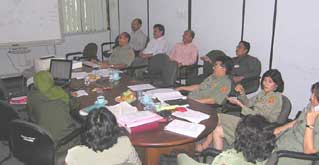
| ENGLISH |  |
BAHASA INDONESIA |  |
日本語 |
|
Human Resource Development for Local Governance (Phase II)
Period: Place: Outline: With the implementation of decentralization, needs have arisen for improving the management capacities of the education and training institutions in the region as one means to build the administrative capacity of the local governments. Moreover, the rules that regulate the decentralization of power in Indonesia are not yet stable and still on a trial-base, considering the two laws (No. 22 and 25 Year 1999) have just been revised in 2004. Therefore, there is an increasing need to socialize the revised laws and to guide the implementation. In response to such needs, this project was implemented as a continuation of the Phase I project to tackle various urgent issues in relations with decentralization policies: (1) technical cooperation focused on the improvement of the management capacity of training institutions (mid-term target), which will in turn contribute to the capacity building of the local government personnel, and (2) technical cooperation focused on training for the dissemination of government administration methods and techniques based on the new laws on decentralization (short-term target).
|



 Return Top
Return Top